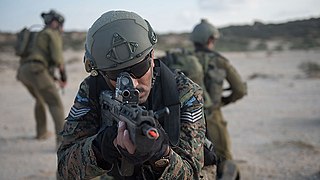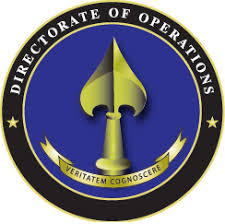Related Research Articles

An intelligence agency is a government agency responsible for the collection, analysis, and exploitation of information in support of law enforcement, national security, military, and foreign policy objectives.

Counterintelligence is an activity aimed at protecting an agency's intelligence program from an opposition's intelligence service. It includes gathering information and conducting activities to prevent espionage, sabotage, assassinations or other intelligence activities conducted by, for, or on behalf of foreign powers, organizations or persons.

India has several special forces (SF) units. The three branches of the Indian Armed Forces have separate special forces units, viz. the Para SF of the Indian Army, the MARCOS of the Indian Navy and the Garud Commando Force of the Indian Air Force. There are other special forces which are not controlled by the military but operate under civilian organisations such as Home ministry’s National Security Guard. Small groups from the military SF units are deputed in the Armed Forces Special Operations Division, which has a unified command and control structure.
Rex 84, short for Readiness Exercise 1984, was a classified scenario and drill developed by the United States federal government to detain large numbers of United States citizens deemed to be "national security threats", in the event that the president declared a National Emergency. The plan was first revealed in detail in a major daily newspaper by reporter Alfonso Chardy in the July 5, 1987 edition of the Miami Herald. Possible reasons for such a roundup were reported to be widespread opposition to a U.S. military invasion abroad, such as if the United States were to directly invade Central America. To combat what the government perceived as "subversive activities", the plan also authorized the military to direct ordered movements of civilian populations at state and regional levels, according to Professor Diana Reynolds.

Defence Intelligence (DI) is an organisation within the United Kingdom intelligence community which focuses on gathering and analysing military intelligence. It differs from the UK's intelligence agencies in that it is an integral part of the Ministry of Defence (MoD) rather than a stand-alone organisation. The organisation employs a mixture of civilian and military staff and is funded within the UK's defence budget. The organisation was formerly known as the Defence Intelligence Staff (DIS), but changed its name in 2009.

The Inter-Services Intelligence (ISI) is the premier intelligence agency of Pakistan, operationally responsible for gathering, processing, and analyzing information relevant for national security from around the world. As one of the principal members of the Pakistani intelligence community, the ISI reports to its Director-General and is primarily focused on providing intelligence for the government of Pakistan.
The Specialist Operations directorate is a unit of the Metropolitan Police of London, UK responsible for providing specialist policing capabilities including national security and counter-terrorism operations. The Specialist Operations Directorate is currently led by Assistant Commissioner Matt Jukes.

The Directorate of Operations (DO), less formally called the Clandestine Service, is one of the smallest components of the US Central Intelligence Agency. It was known as the Directorate of Plans from 1951 to 1973; as the Directorate of Operations from 1973 to 2005; and as the National Clandestine Service (NCS) from 2005 to 2015.

The Directorate General of Forces Intelligence, commonly known as DGFI, is the military intelligence section of the Bangladesh Armed Forces, tasked with collection, collation, and evaluation of strategic and topographic information, primarily through human intelligence (HUMINT). As one of the principal members of the Bangladesh intelligence community, the DGFI reports to the Director-General and is primarily focused on providing intelligence for the Prime Minister, the Cabinet of Bangladesh, and the Armed Forces of Bangladesh.
The Australian Intelligence Community (AIC) and the National Intelligence Community (NIC) or National Security Community of the Australian Government are the collectives of statutory intelligence agencies, policy departments, and other government agencies concerned with protecting and advancing the national security and national interests of the Commonwealth of Australia. The intelligence and security agencies of the Australian Government have evolved since the Second World War and the Cold War and saw transformation and expansion during the Global War on Terrorism with military deployments in Afghanistan, Iraq and against ISIS in Syria. Key international and national security issues for the Australian Intelligence Community include terrorism and violent extremism, cybersecurity, transnational crime, the rise of China, and Pacific regional security.
Harry B. "Skip" Brandon founded Smith Brandon International, Inc. with Gene M. Smith in 1996. Smith Brandon International is a boutique corporate investigations and risk consulting firm based in Washington, D.C. Brandon is currently company COO. He is a former deputy assistant director of national security and counterterrorism for the Federal Bureau of Investigation. He retired from the FBI in 1993 after 23 years.
Proactive, Preemptive Operations Group is a proposed U.S. intelligence agency that would employ "black world" tactics.
The Safari Club was a covert alliance of intelligence services formed in 1976 that ran clandestine operations around Africa at a time when the United States Congress had limited the power of the CIA after years of abuses and when Portugal was withdrawing from Africa. Its formal members were the pre-revolution (Pahlavi) Iran, Egypt, Saudi Arabia, Morocco and France. The group maintained informal connections with the United States, South Africa, Rhodesia and Israel. The group executed a successful military intervention in Zaire in response to an invasion from Angola. It also provided arms to Somalia in its 1977–1978 conflict with Ethiopia. It organized secret diplomacy relating to anti-Communism in Africa, and has been credited with initiating the process resulting in the 1979 Egypt–Israel Peace Treaty.
The counter-terrorism page primarily deals with special police or military organizations that carry out arrest or direct combat with terrorists. This page deals with the other aspects of counter-terrorism:

After the Central Intelligence Agency lost its role as the coordinator of the entire Intelligence Community (IC), special coordinating structures were created by each president to fit his administrative style and the perceived level of threat from terrorists during his term.
The National Security Investigations Team (NSIT), known as the Special Investigation Group (SIG) prior to 2016, is a New Zealand government group that focuses on threats to national security, formed in response to the September 11 attacks. It is part of the New Zealand Police, with four NSIT teams in regional centres around the country.

The CIA publishes organizational charts of its agency. Here are a few examples.
Merchant International Group (MIG) was a privately owned British strategic research and corporate intelligence company with offices in London, Hong Kong and Vienna.

Smith Brandon International, Inc. (SBI) is an American boutique corporate investigations and risk consulting firm based in Washington, D.C. It was founded in 1996 by Gene M. Smith and Harry "Skip" Brandon and today employs a worldwide network of investigators, including former heads of law enforcement agencies, political figures and professionals with legal, financial and intelligence backgrounds. SBI offers a range of services, including high-level political analysis, global due diligence, risk avoidance, corporate investigations, financial investigations, political risk assessments and business intelligence services.

The National Intelligence and Security Agency (NISA) Somali: Hay'ada Sirdoonka iyo Nabadsugida Qaranka (HSNQ) is the national intelligence agency of the Federal Republic of Somalia. It carries out secret service, intelligence and covert operations. NISA's main objective is to collect intelligence and to safeguard Somalia's national interests. The job is to identify and block threats to the state and its citizens and to reinforce the country's security and safety according to the Provisional Constitution of the Federal Republic of Somalia. It is headquartered in Mogadishu. The NISA is also closely intertwined with the Somali Armed Forces and regularly cooperates with them.
References
- ↑ Stuart Poole-Robb Launches a New Outfit, Intelligence Online, May 27th, 2010
- ↑ Stuart Poole-Robb Profile Story, The Independent, October 3rd, 1999
- ↑ Interview with Stuart Poole-Robb, CEO of Merchant International Group, The Independent, December 30th, 1998
- ↑ KCS Group - Internet Security Division
- ↑ Stuart Poole-Robb, Risky Business, Google Books
- ↑ Stuart Poole-Robb, Risky Business, IT Governance Book Review
- ↑ Stuart Poole-Robb - Martial Arts Federation of Great Britain, Companies in the UK